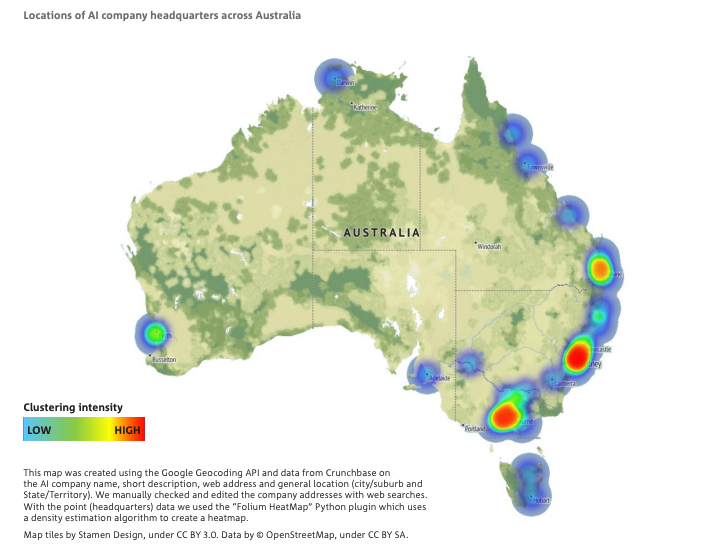Key points
- Our latest artificial intelligence (AI) ecosystem report provides the who, what, when and where of Australia's growing AI industry.
- There are 544 AI companies headquartered in Australia and we are prolific AI researchers, but we lag behind global competitors when it comes to commercialising technologies.
- Tracking our AI ecosystem will help policy makers in government and strategists in industry catalyse the growth of Australian-made AI.
Overseas companies tend to dominate the headlines when it comes to artificial intelligence (AI). But we’ve discovered there’s more happening in Australia than you might think. And we’re on a trajectory to do more in the future.
Australia's AI Ecosystem Report 2023 has revealed Australia has a nimble and growing AI ecosystem that's on par with some of the world's AI leaders.
The report provides businesses, investors, government and research institutions with current analysis of Australia’s AI ecosystem, and how to advance it. Let's unpack some of our key findings.
Who’s who in the AI ecosystem zoo
Practically all companies use AI in one way or another. But through this work, we identified 544 AI companies headquartered in Australia. These are companies whose raison d'etre (reason for being) is making and selling AI products and services. This number is on par with global AI leaders. For example, the Canadian 2023 AI ecosystem report found 670 AI companies. Given Canada’s economy and population is 28 per cent and 49 per cent respectively larger than Australia’s, it can safely be said we’re doing well.
We also found our AI ecosystem is having a growth spurt. A total of 396 AI companies opened for business in Australia over the past decade and 204 in the past five years. That’s a year-on-year growth rate of 7.7 per cent over the past five years.
Australia’s AI companies are young and nimble. Their median age is six years. This compares to 13 years for the information, communication and technology (ICT) sector. And ICT companies tend to be younger than other industries.
In terms of what these companies do, Australia’s AI companies lean towards business application and adoption activities, more than building new AI technology products. However, there’s a diversity of companies filling many spaces within the AI supply chain.
Collaborative clusters of Aussie AI companies
Another interesting characteristic of Australia’s AI ecosystem is its tendency for geographic clustering. Apparently, like tech companies generally, Aussie AI companies love good neighbours.
We mapped the longitude and latitude of all 544 companies and used a spatial clustering machine learning algorithm called DBSCAN to identify clusters.
We found eight clusters containing 296 AI companies in Sydney, Melbourne, Brisbane, Perth and Adelaide. We found within a cluster the average straight-line distance between an AI company and its nearest neighbour was 80 metres. There’s likely to be competition between our AI companies, but there’s also likely to be much cooperation with skills, resources and knowledge sharing.

Australians are AI knowledge generators
We examined AI research and development (R&D) activities measured as peer-reviewed publishing and patent activity. We found 9.6 per cent of all peer-reviewed research by Australian authors referred to AI technologies in the title, abstract or keywords. This is up from 2.5 per cent in the year 2000 and above the global average of 7.2 per cent.
We used the OECD Revealed Technology Advantage metric to identify areas of AI research application domain specialisation in Australia compared to the globe. Our top three AI application domains were livestock production, medical laboratory technologies and horticulture.
While Australia’s AI R&D sector, public and private, contributes to 1.6 per cent of global AI knowledge generation (research publishing), we discovered the nation contributes to only 0.2 per cent of global AI patent inventions.
This suggests Australians don’t convert our knowledge about AI into commercial products at the same rate as other countries. However, it may be related to relatively low levels of R&D spending with 1.8 per cent of Australia's GDP being invested in R&D compared to the OECD average of 2.7 per cent.
Data-driven insights to take our AI ecosystem global
This snapshot reveals a young, nimble and growing AI ecosystem in Australia. The data reveals the challenge of progressing Australia’s AI ecosystem into a space with more knowledge discoveries translating into more commercial products which can be exported to global markets.
If this happens it will most likely be within specialised and niche areas of AI technology and domain application given the scale of the global AI ecosystem. We can already see some of these niche AI specialisations emerging and they could be further sharpened and developed into the future.
We also highlight a need to strengthen the linkage across the AI ecosystem and leverage the Australian brand to boost the development of safe and responsible AI.
This report builds upon the first AI Ecosystem report launched in 2022. Future iterations of the AI ecosystem report could examine skills and education, the workforce, industry adoption patterns and productivity issues.
Tracking our AI ecosystem, and creating these datasets, will help policy makers in government and strategists in industry navigate a pathway through the coming era of technology disruption and catalyse the growth of Australian-made AI.
